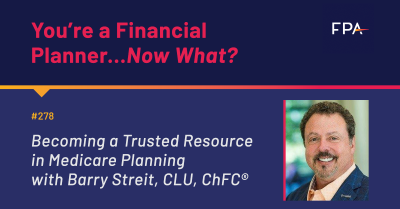
The “health-wealth connection”
What makes a great financial planner? This is a topic that has been discussed many times on You’re a Financial Planner...Now What?, and answers vary depending on who we’re talking to. That’s one of the best parts of having such a diverse cast of guests on our podcast.
One thing that has helped Hannah in her career is, surprisingly, knowing information about Medicare. While the traditional view of a financial advisor’s role might include investments or savings plans, times have changed. Medicare is a big part of how we help our clients, Hannah said.
That’s why it was such a thrill to have Barry Streit as a guest on YAFPNW. Before beginning his 13-year career at United Healthcare, Barry worked in financial services. He spent about 10 years at Charles Schwab in San Francisco, worked at TD Ameritrade, and also ran a broker dealer in Chicago. This experience has given him a unique understanding of what he called the “health-wealth connection:” how post-retiree healthcare and financial advising intertwine.
Why we should think about Medicare
The biggest reason we financial planners should care about Medicare, Barry said, is that consumers are already turning to their financial advisors for information or advice on it.
“Baby boomers are much more likely to want to do research...but they are not necessarily turning to the traditional Medicare agent that's been in the business for many, many years,” said Barry. “They are starting to turn now towards their financial advisors or their CPAs or anybody else...they trust.”
Because financial advisors today are getting Medicare questions much more often than they ever did, it’s important that they have some sort of answer for their clients.
“You just don’t want to say ‘No, I don’t do that’ to a client,” said Barry. “That’s just not obviously the best experience that most of us want to put out there for our clients.”
The differences in Medicare options can be very confusing for financial advisors, not to mention any changes in rules. Barry pointed out that we planners tend to focus on what drives revenue rather than something new we can offer our clients. But understanding Medicare so we can help our clients is a big opportunity for success.
Understanding Medicare options for your clients
The Medicare options available are “not simple...it’s complicated because of how the government chose to design and name a lot of the plans,” Barry said. Still, he broke down Medicare in the following (helpful) way.
Part A and Part B
Also known as original Medicare, Part A and Part B cover inpatient care, outpatient care, home health care, medical equipment, and more. Part A and Part B do not cover drugs.
Medicare Supplement
Medicare Supplement, in exchange for a monthly premium, pays for all or most of whatever Medicare doesn’t cover.
Part D
Thanks to a partnership between the government and private companies, Part D helps cover the cost of prescription drugs.
Part C
Also known as Medicare Advantage, Part C bundles everything together: the hospital, doctors, drugs, and other health benefits like hearing aids, eyeglasses, gym memberships, and so on.
Plans vary by market and by location. Take that into account for clients who are planning to move across states, or even into new counties.
Providing value to younger clients and their families
If you have a younger client base, you may not need to know Medicare as thoroughly to meet their needs. But there are opportunities in the parents or even other family members, Barry pointed out. Clients in their 30s or 40s often have their parents or older relatives asking them for help understanding and choosing Medicare plans anyway.
“Instead of the son or daughter having to figure out the Medicare options, you can offer to help their parents or family members through your own practice,” said Barry. “And there's just a great way to add value, and perhaps even pick up more clients when you talk to the parents.”
You don’t need a license or certification to talk about Medicare in general with clients. Financial planners can discuss the program and rules, as well as refer out to a Medicare expert. The Medicare.gov website is a great starting point for planners to learn more about it, Barry said.
As Barry demonstrated in this episode, being knowledgeable about Medicare is a smart move, particularly because clients are asking their financial advisors about it already. It’s just another way to add value and to keep leveling up your skills.
“The most successful advisors that I've talked to are constantly evolving their practice, and constantly adding the products that make sense for their consumers,” said Barry. “And that's what this is all about.”
What You’ll Learn:
- Barry’s experience in financial services
- Why financial planners should be thinking about Medicare
- Breaking down Medicare options
- Working with a younger client base
- What IRMAA is
- What a conversation about Medicare might look like
- Common pitfalls facing Medicare consumers today
- Where you can learn more about Medicare
In this episode of YAFPNW, Hannah and Barry talk about:
Interested in following Barry? Follow him on LinkedIn!